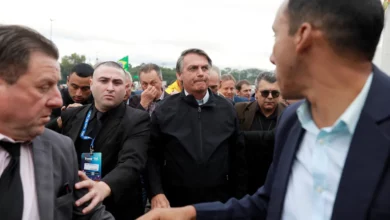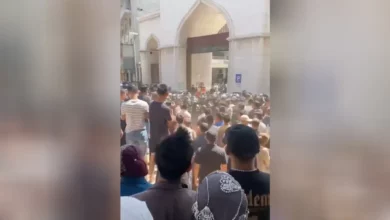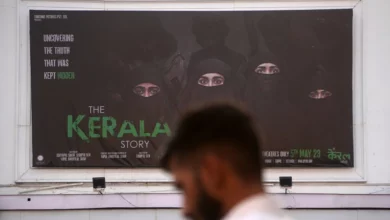Amsterdam–Dutch politician Geert Wilders faces trial in his own country on charges of hatred and discrimination against Muslims. Wilders, a member of parliament from the Freedom Party, has made a name for himself attacking Muslims and their religion and in January, the Dutch High Court agreed to hear charges against him. This March, the Freedom Party stands to win 17 percent of seats in parliament, if opinion polls are to be believed.
Wilders has come to epitomize the rising tide of Islamophobia that is sweeping much of Europe. Among the headline-catching events in this trend are attempts in the French parliament to ban the niqab, and a Swiss referendum banning the construction of minarets. The Netherlands, too, has become a focal point for anti-Muslim and anti-immigrant sentiment.
Roughly six percent of the Netherlands’ population, or about one million people, are Muslim. Most are of Turkish and Moroccan origins. Wilders and his supporters believe these Muslims pose a threat to the "Dutch way of life."
The Netherlands has a long-standing reputation for being a tolerant country with liberal views, where immigrants are given new homes and the unemployed are looked after. Tolerance, until recently at least, was believed to be an essential part of being "Dutch." The courts have played a role in upholding this tradition. In the past, right-wing MPs have been convicted on charges of inciting racial hatred. Wilders’ case, however, will test the extent to which the Netherlands has changed its tolerant attitudes.
In its 2008 report on the Netherlands, the European Network Against Racism (ENAR) concluded that “in 2008, the public debate in the Netherlands around the topics of discrimination and racism was dominated by the discussion on the position of Muslims in the country.”
The report continues, “[f]requently, Islam is portrayed as a threat to Dutch society by politicians and pundits. This attitude is sometimes extended to include a general rejection of immigration and migrants, often expressed under the cover of freedom of speech.” ENAR identified the Moroccan community in the Netherlands as "particularly vulnerable."
In other international inquiries on discrimination and racism, the Netherlands fared just as badly. The 2008 report by the European Commission Against Racism and Intolerance (ECRI) and the Eurobarometer of 2009 confirm the findings of ENAR. The Eurobarometer found that a staggering 80 percent of the Dutch population believe discrimination on the basis of ethnicity to be “fairly to very widespread,” and 59 percent of Dutch believe discrimination on the basis of religious belief to be “fairly to very widespread.” Both of these numbers are the highest in Europe.
In recent years, Geert Wilders has become the face of the Dutch right-wing. His views have caused international outcry and condemnation. In 2008 Wilders released a film to support his view that the Quran is a fascist book that incites its believers to violence. He was subsequently banned from entering Britain.
But within the Netherlands, established political parties are still reluctant to condemn Wilders. How did the Dutch lose their aura of tolerance?
Miriyam Aouragh, a Dutch citizen of Moroccan descent, dedicated anti-racism activist and research fellow at the Oxford Internet Institute, claims that Dutch tolerance was never based on equality to begin with.
“The rough edges between social groups were covered up by the government instead of actually being addressed," says Aouragh. "Protestants, Catholics, socialists, and liberals all lived in their own compartments of society, separately and peacefully, never feeling the need to invest in each other.”
Until the late 1960s, Dutch society was very much structured according to religious and political lines, with the government imposing tolerance from above. Catholics, Protestants, socialists and liberals had their own institutions and public spaces. According to Aouragh, although this division has officially disappeared, remains can still be seen in public life.
Moreover, says Aouragh, “The Netherlands never had a colored and diverse social movement that was capable of putting racism on the public agenda. The social movements of the 1960s and 1970s were dominantly white and middle-class.
Khalil Aitblal, spokesperson for the Union of Moroccan Mosques in Amsterdam and the surrounding area, agrees. He says that the tense atmosphere is due to "a lot of pent-up frustration. This frustration is now being used by people with political agendas.”
In two relatively recent prominent incidents, this frustration manifested itself on the Netherlands’ streets, with violent consequences that helped ratchet up the level of racial tension in the small nation.
A definitive change in Dutch politics was caused by the emergence on the political scene and the subsequent murder of Pim Fortuyn. The right wing politician managed to tap into the frustrations of the white Dutch community by, in his words, “breaking through the boundaries of political correctness.”
The flamboyant politician labeled Islam “a backward culture,” and expressed his wish to prohibit any Muslims from entering the country. On 6 May 2002, nine days before the parliamentary elections in which he was expected to achieve a landslide victory, he was shot dead by a Dutch environmental activist.
“Fortuyn’s death unleashed a sentiment that, although probably already under the surface, still shocked many. His constant attack on Muslims was undoubtedly an important reason he was killed," says Aouragh. "Linking Muslims to the murder of Fortuyn thus became a common slip of the tongue. Muslims were held partly responsible and the anti-Muslim polemics increased.”
The event paralyzed the left. One of Fortuyn’s legacies was a stiffening taboo surrounding "political correctness," thus silencing more nuanced voices by calling them old-fashioned or out of touch with reality. Many in the country felt the political left to be partially responsible for the assassination. The phrase “the bullet came from the left,” referring to the gunshot fired by a leftist, was a much-heard slogan.
Despite the assassination, the government decided the elections would be held as planned. "We witnessed a political earthquake. Ticking his right-wing party on the ballot was like signing Fortuyn’s condolence book,” says Aouragh.
These events coincided with the start of the "war on terror," unleashed by George W. Bush after the attacks on 11 September 2001. Suddenly Islam was the new enemy of the free world and the Muslim religion was made out to be backward and anti-democratic.
Then the Dutch experienced what Aouragh calls “our 9/11", the killing of celebrity filmmaker Theo van Gogh by a 26-year-old Dutch citizen of Moroccan descent. Under the guise of freedom of speech, the filmmaker had attacked Muslims ferociously on numerous occasions.
“The initial relief that the killer of Fortuyn was not a Muslim, was avenged and a new level of anti-Muslim violence prevailed,” Aouragh says.
Almost no one in the Netherlands dared oppose the anti-Muslim sentiments coming from politicians and the media. Aitblal describes the role of the media as “crucial in shaping public opinion.”
Once again, the Dutch left seemed stupefied. Aouragh describes the attitude of the political left in the Netherlands as “better safe than sorry.”
“The distinction between left and right collapsed in relation to Islam,” she says. “Because the parties depend on votes during elections held almost every two years, they play a spineless role most of the time. Consequently, the Dutch political left had no backbone when it was most needed.”
This was the climate in which Geert Wilders came to prominence.
Wilders started his political career in the Liberal Party. He founded his own party after clashing with the Liberal leadership over his stance toward Muslims and Turkey’s admission to the European Union, which he firmly opposed.
Simultaneous with Wilders’ rise has been an increase in violent attacks on Muslims and continuing “prejudiced reporting by the media,” as ENAR calls it.
In November 2009 a mosque in the city of Zoetermeer was attacked with a Molotov cocktail, and when the global financial system was collapsing, the Dutch media focused on what Wilders called the “Gouda Intifada”, a violent incident involving Moroccan youths in the city of Gouda.
According to the latest opinion polls, Wilders’ party, the Freedom Party, is expected to receive 17.3 percent of the vote, or 26 seats in parliament. This would make the Freedom Party either the first or second largest party in parliament, destining Wilders to be the next prime minister.
But this does not mean that racists have taken over the Netherlands.
“Even though Wilders’ statements aren’t constructive or contributing to the social cohesion, a lot of issues which used to be taboo or sensitive are now being talked about. It is up to us to keep focusing on keeping the balance in society,” says Aitblal.
The court case against Wilders is garnering much attention in the Netherlands, but it is too early to predict the effect any verdict will have on the public debate.
A conviction wouldn’t turn the tide of Islamophobia, but it would probably be seen as support for those campaigning against Islamophobia in the Netherlands. If Wilders is acquitted, he will be more confident about the legality and the truth of his words. An acquittal also has the potential to boost Wilders’ popularity as a candidate.
Wilders in the meantime is on the attack, labelling the trial as “political." In a statement he said, “apparently in this country expressing one’s opinion can be considered a crime.”




